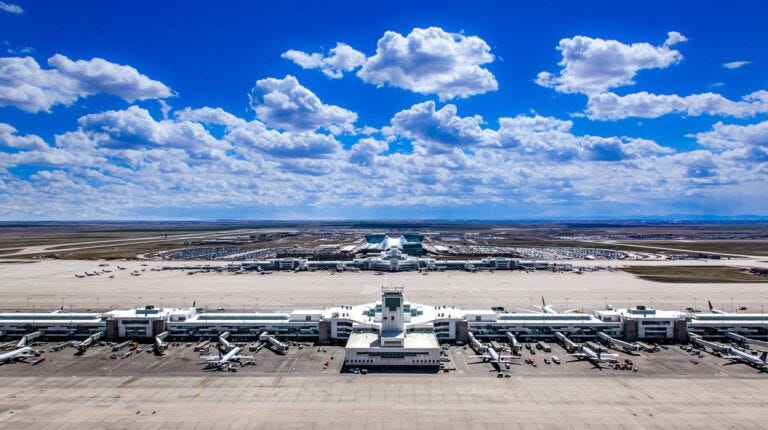#Sustainability20: Chooose expands emissions data offerings with IATA partnership & more
Weekly Roundup - 08/08/25
Each Friday, we publish a round-up of the 20 most important stories on sustainable aviation. You can see previous editions of #Sustainability20 here.
Industry Updates
Chooose has partnered with IATA to integrate CO2 Connect emissions data into its platform, enabling airlines to provide accurate flight-specific carbon reporting to corporate and consumer customers, enhancing transparency in sustainability efforts.
Denver Airport has launched a $1.25 million feasibility study into small modular nuclear reactors to meet future energy demands, exploring whether SMRs could provide clean, reliable power for its expanding operations.
Airlines worldwide are adopting ultra-precise carbon reporting tools using real-time flight data, replacing estimate-based calculators to improve emissions transparency and combat greenwashing as climate accountability pressures grow.
CLIMATE WATCH: California wildfire season starting earlier because of climate change, study finds - The New York Times
New research confirms California’s wildfire season now starts up to two months earlier due to climate change, with greenhouse warming accelerating snowmelt and drying vegetation faster than in previous decades.
Infrastructure and operational efficiencies
NATS has embraced remote working to cut emissions, despite criticism over past system failures linked to staff not being on-site during disruptions.
Finnair and CN Logistics have partnered to co-fund SAF for air cargo shipments, reducing Scope 3 emissions as part of Finnair’s net-zero strategy and broader sustainability commitments.
Sustainable Aviation Fuel (SAF)
Rayonier Advanced Materials and GranBio have signed an MoU to explore a cellulosic SAF plant in Georgia, leveraging GranBio’s AVAP technology and DOE funding to produce low-carbon jet fuel.
EcoCeres and Xiamen Airlines are collaborating to convert waste cooking oil into SAF, aiming to cut aviation emissions by 80% while strengthening sustainable fuel supply chains.
LG Chem and Enilive have broken ground on South Korea’s first HVO and SAF plant, set to produce 400,000 tonnes annually from 2027 using waste feedstocks and Ecofining tech.
Ghana’s F&B Bio Recyclage plans to convert municipal waste into SAF using gasification and Fischer-Tropsch processes, addressing both waste management and aviation decarbonisation in a pioneering African initiative.
Manchester Airports Group has welcomed £63m in UK government SAF funding, including £4.5m for Essar and NorthPointe Energy to develop production at Stanlow, supporting MAG’s net-zero 2038 target.
Thailand is drafting its first SAF standards based on ASTM International guidelines, with public consultations expected by September 2025, as part of efforts to cut aviation emissions.
New technology: Electric and Hydrogen
Joby Aviation has agreed to acquire Blade’s passenger air mobility business for up to $125 million, gaining urban terminals and expertise to accelerate its electric air taxi rollout from 2026.
AIR has secured $23 million in Series A funding to scale production of its eVTOL cargo and passenger aircraft, supported by new FAA rules easing certification for light sport models.
Bye Aerospace and Electro.Aero are developing portable fast-charging systems for electric training aircraft, enabling 30-minute turnarounds to meet flight schools’ high-utilisation demands.
Joby Aviation and L3Harris are collaborating on an autonomous hybrid VTOL for defence missions, with flight tests starting this autumn and operational demonstrations planned for 2026.
China’s AutoFlight has completed the world’s first offshore cargo flight using its certified CarryAll eVTOL, cutting delivery times to oil platforms from 10 hours to 58 minutes.
Pivotal has demonstrated its eVTOL for emergency services across California, showcasing its potential to improve response times in hard-to-reach areas, with fire departments praising its life-saving capabilities.
Textron eAviation has paused its Nexus eVTOL programme, reallocating engineers to other projects including the Panthera aircraft and Nuuva V300 drone, citing shifting market demands.
Hexagon warns that next-gen aircraft projects face delays due to high costs and skills shortages, urging manufacturers to adopt automated inspection tech to streamline production and innovation.
Michigan’s Capital Region International Airport has installed the state’s first electric aircraft charger, partnering with BETA Technologies to support future low-carbon aviation and emergency services.







